Humans all over the world raise goats and have for centuries. Many people today dream of having a herd, whether for companionship, milk, or meat, but don’t know where to start. Whether you have a green space in the country or in the city, here is everything you need to get started raising backyard goats.
Before diving in further, we need to discuss privilege. Colonizers stole and divided up much of the land in the world, their ancestors are the majority of those who have the space to raise goats. If you can afford to raise goats and don’t rely on them for income, critically think about how you can use your position to ensure everyone gets their needs met and can live a fulfilling life.
Do Your Research
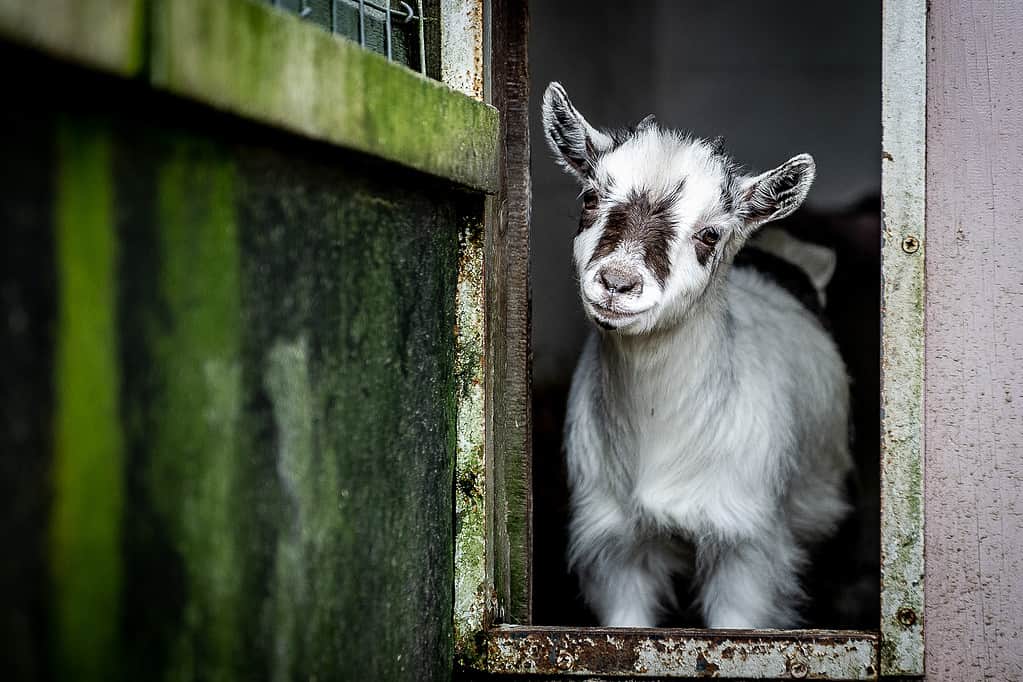
Each city has different rules about goats.
©Paul Moore Photography/iStock via Getty Images
Before you get backyard goats, you need to do some research. Check the ordinances of your city to see whether it’s legal. If it’s legal, go ahead but the city might also have rules about how many goats you can keep. You should also do research on the specific breed of goat you want, which will depend on whether you want meat, milk, or pets. When raising animals in a yard, smaller herds are better. You’ll probably want to avoid getting kids if you live in an urban area because they can be quite loud.
Inform Your Neighbors
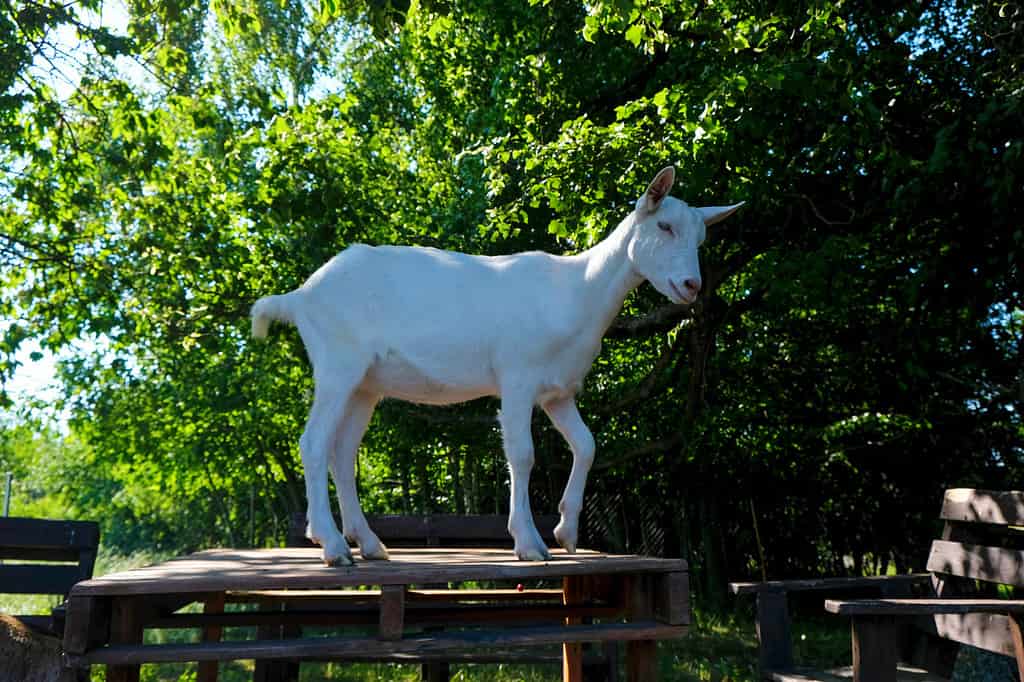
Goats
are very intelligent.
©iwciagr/Shutterstock.com
Even if you have a backyard that spans acres, you’ll still want to inform your neighbors. Goats roam, are escape artists, and love to chew on whatever they come across. Because of these factors, you’ll want to talk to the people who share fences with you. Clearly explain your plans and how you’ll set up their enclosure. You can even offer some meat or milk to win them over.
Find a Vet
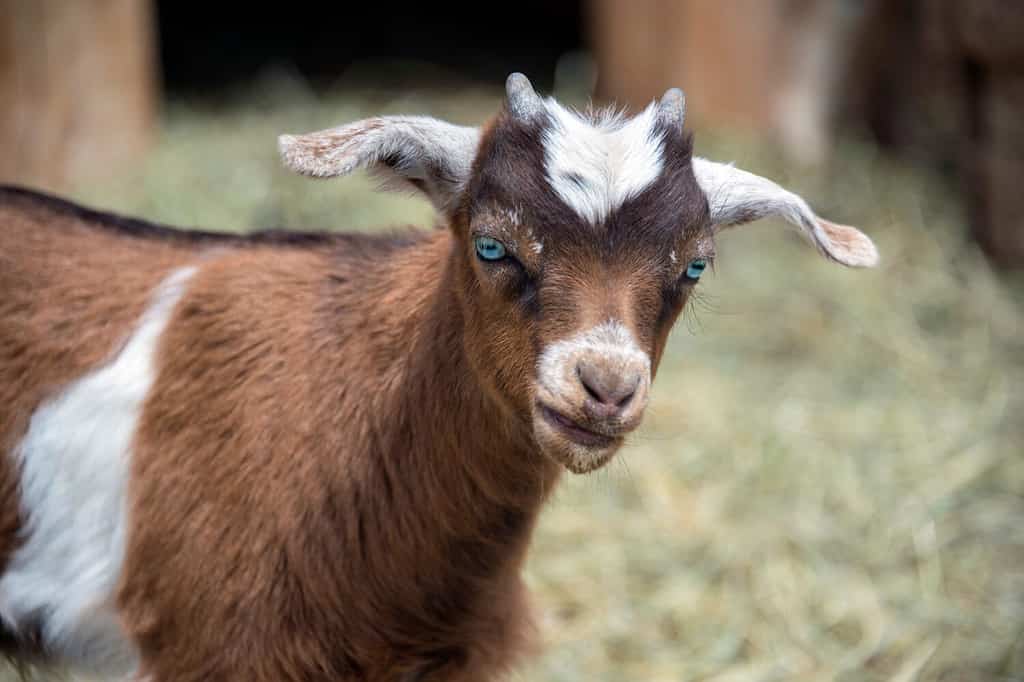
Raising backyard goats requires a specialized vet on call for emergencies.
©Georgia Evans/Shutterstock.com
Having a specialized doctor within easy driving distance is essential to raising backyard goats. You need to find a vet that works with farm animals. They’ll know common goat diseases and what to look for during regular checkups. If there are no vets in the area, reconsider getting goats. Plus, you want to find a vet you can trust and feel good about. Don’t go with one you doubt or dislike just because you want goats.
Deworm and Vaccinate Your Goats
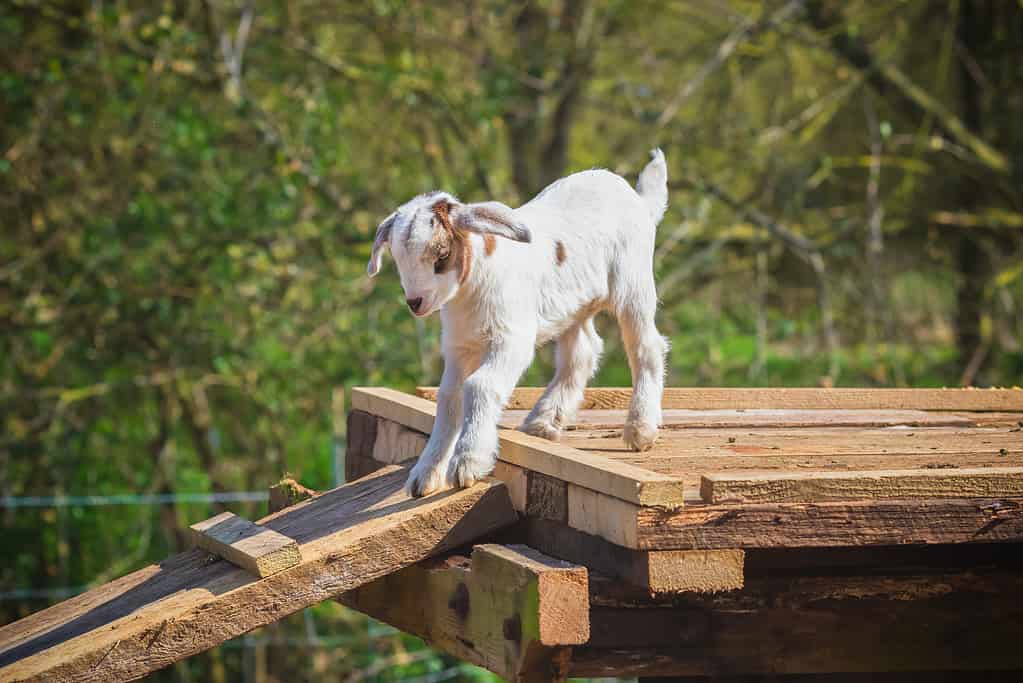
Keeping your goats healthy helps you avoid having to put your animal down.
©VictorHuang/iStock via Getty Images
Enterotoxaemia is a disease goats catch frequently. Goats can experience one of three forms, peracute, acute, and chronic. The symptoms include diarrhea, which is most common in the acute and chronic forms. While research is still in process, vaccinating your goats will keep them strong against enterotoxaemia.
For backyard goats, you also need to check for worms regularly. You’ll notice sudden weight loss, pale eyelids and gums, a rough coat, and a loss of energy. Plus, the animal will look quite sick.
Contact your trusted vet and ask them to identify the specific kind of worm. Then, if they have a specific dewormer that they recommend. You can get an organic herbal remedy or one that’s medicinal. If you go organic, be prepared for an extensive schedule that you need to maintain consistently.
Fencing
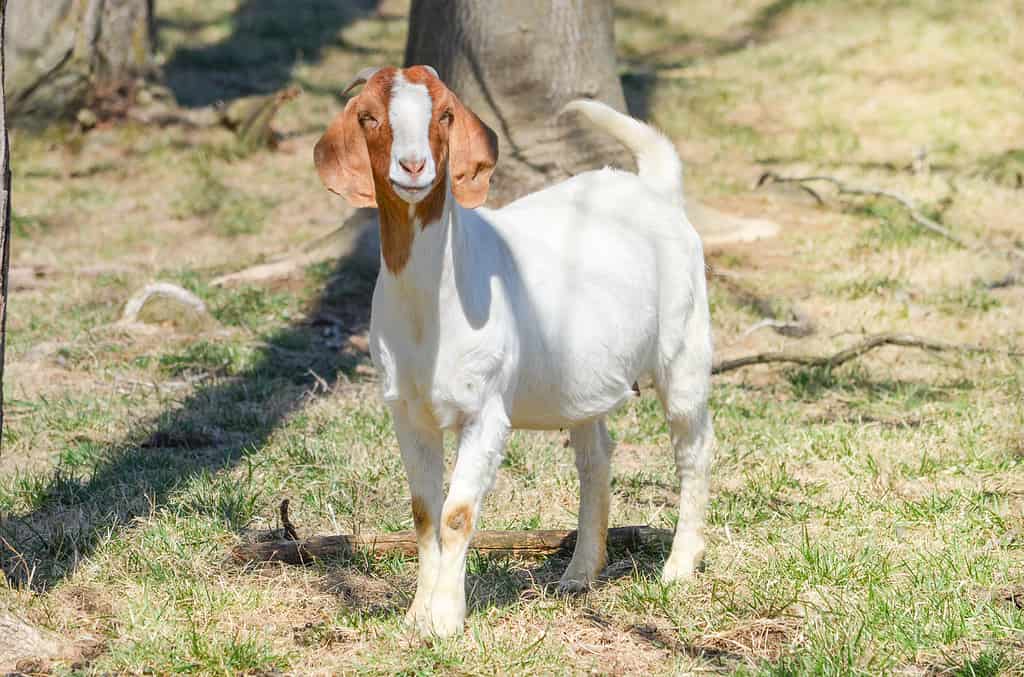
Goats follow directions well but can be stubborn.
©DonnaA Country Photos/Shutterstock.com
Goats have a reputation for pushing their way through holes in the fence or even jumping over it. They specifically look for weaknesses in the fencing and will jump, kick, and headbutt to persistently wear it down. Since your goats will always want to go for an adventure, make sure to always latch your gate and repair your posts. You’ll need a special latch since goats can open regular ones with their mouths. You want to design your fencing to keep your goats in and predators out.
Set Up Their Space
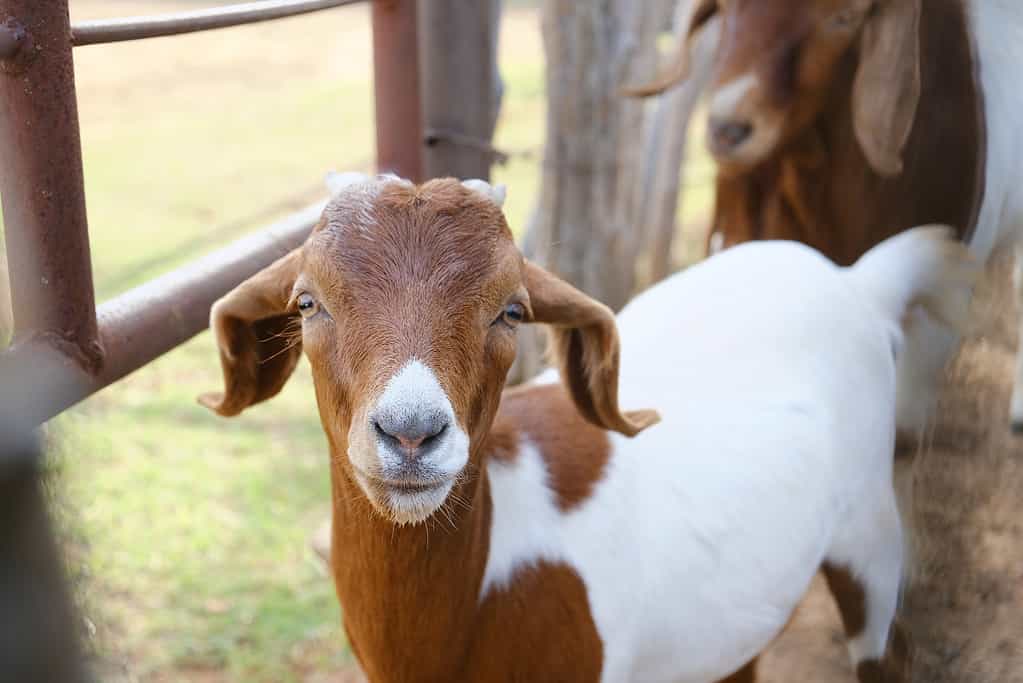
Goats need high and low places to jump and play on.
©iStock.com/Candice Estep
Goats need a place to sleep safe from the weather. You can build a structure with three walls and a roof in most cases. If the weather is intense in your area, give them stalls with four walls and a roof. Goats need dry and clean air and do not do well in moist, damp areas. Also, you’ll want to provide spots that the goats can rub their horns against.
You’ll want to clean their space every day, since they can get a bit messy. Clear their waste and make sure that you are freshening their hay. You’ll also want to refill their water and provide new toys if they wear out current ones.
Provide Bedding
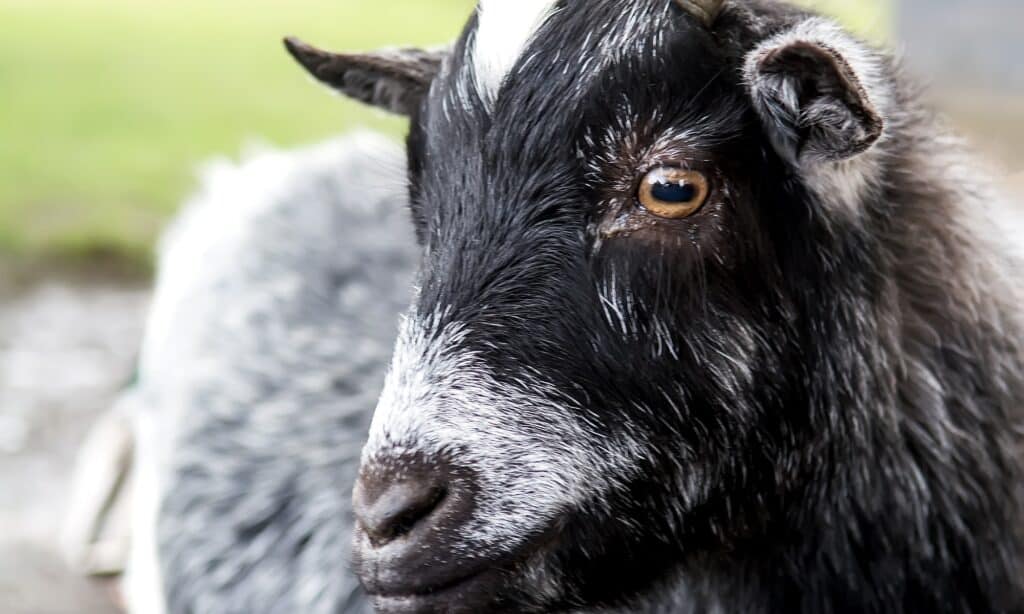
Regularly change your goats bedding.
©iStock.com/alisa24
For nesting, goats need dry and comfortable bedding. The bedding should be a mixture of straw, hay, wood chips, and sawdust. If you have frequent wind in your area, skip the sawdust. Maybe you didn’t know this, but goats toss and turn often in their sleep. Sometimes they also throw their bedding around. You’ll have to gather their bedding together each morning while the animals are out.
Give Them a Specific Diet
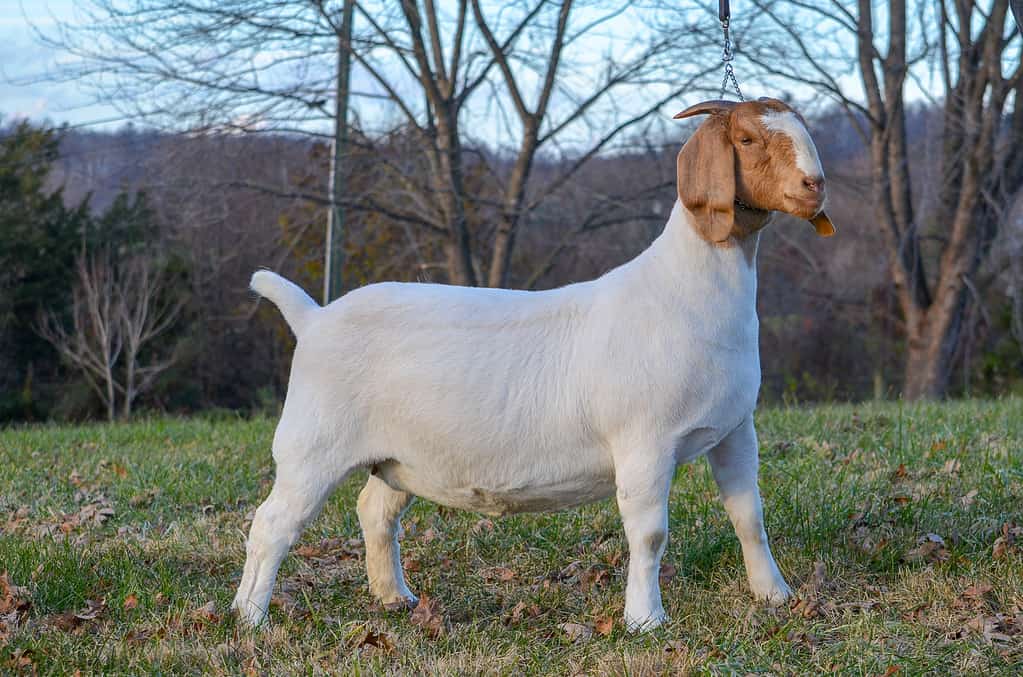
Like other animals, goats have dietary preferences.
©DonnaA Country Photos/Shutterstock.com
While goats are quite hardy on the outside, their insides are pretty sensitive. They cannot eat human food and require a specific diet. For backyard goats, you want to feed them a mixture of hay, greens, and leaves. The animals prefer alfalfa or a mixture of timothy and grass. Each goat will need two to four pounds of hay. You’ll want to give your goats time to free-roam, at least a few hours a day. During this time, they will forage on grass, weeds, and bushes.
For any changes in their feed, go slow and gradual. The bacteria balance in the goat’s stomach takes a while to adjust. Offer pregnant goats grain feed and pellets to supplement their nutritional needs.
Remember Their Vitamins and Minerals
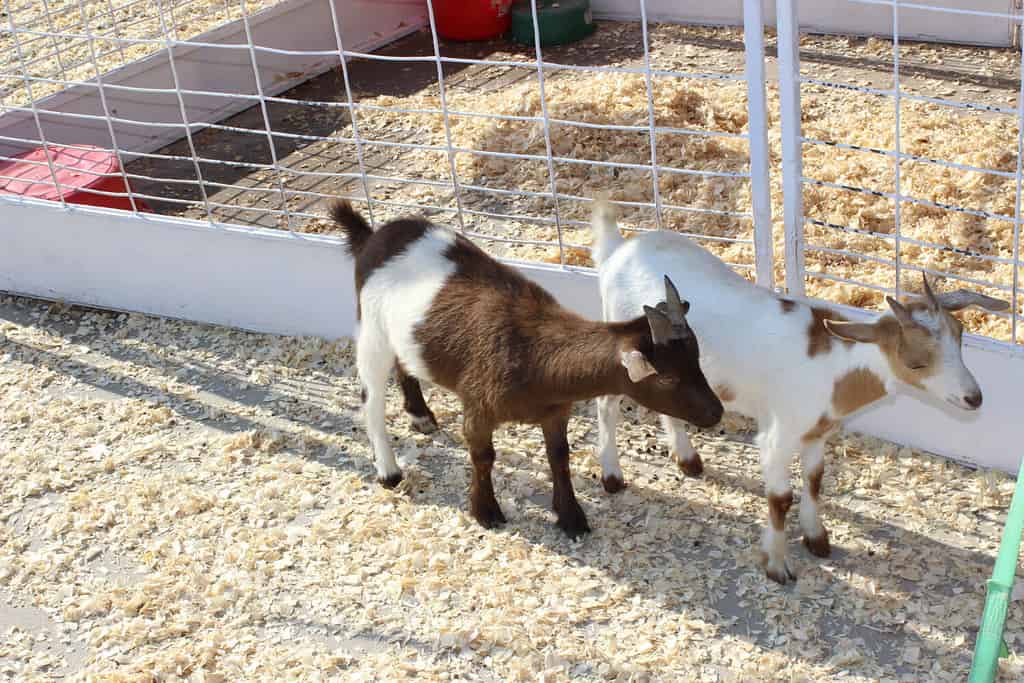
Smaller and quieter breeds work better in city backyards.
©Jon Kraft/Shutterstock.com
Goats, like humans, need specific nutrients to survive. In their natural habitats, the animals get the nutrients from foraging. For backyard goats, you’ll need to supplement their diets. The animals need copper, which comes from specific goat feed. Sheep feed does not include the mineral. You can also use blocks of copper that the goats can lick throughout the day.
If they have a deficiency, you’ll notice symptoms like difficulty breathing, skin issues, and excessive saliva. You’ll want to check with your vet to identify with vitamin or mineral is the issue. Goats also need salt, which they can lick, or you can add it to their water. You can give them baking soda to help their digestion. Other minerals that goats need include:
- Zinc
- Calcium
- Phosphorus
- Iodine
- Manganese
- Potassium
- Sulfur
- Iron
- Vitamins A, D, E
Provide Fresh, Clean Water

The
fainting goat
has a genetic condition that causes them to faint if they are shocked or surprised, which might not make them good for the backyard.
©iStock.com/passion4nature
Every day, you need to change the water for your backyard goats. Goats can become ill if they drink dirty water. If you live in an area that gets windy or dusty, you might need to change their water multiple times in one day. You can also use a pond or creek that humans regularly test for harmful bacterias. A creek is preferable since stagnant water is more likely to have bacteria.
Regularly Brush the Goats and Trim Their Hooves
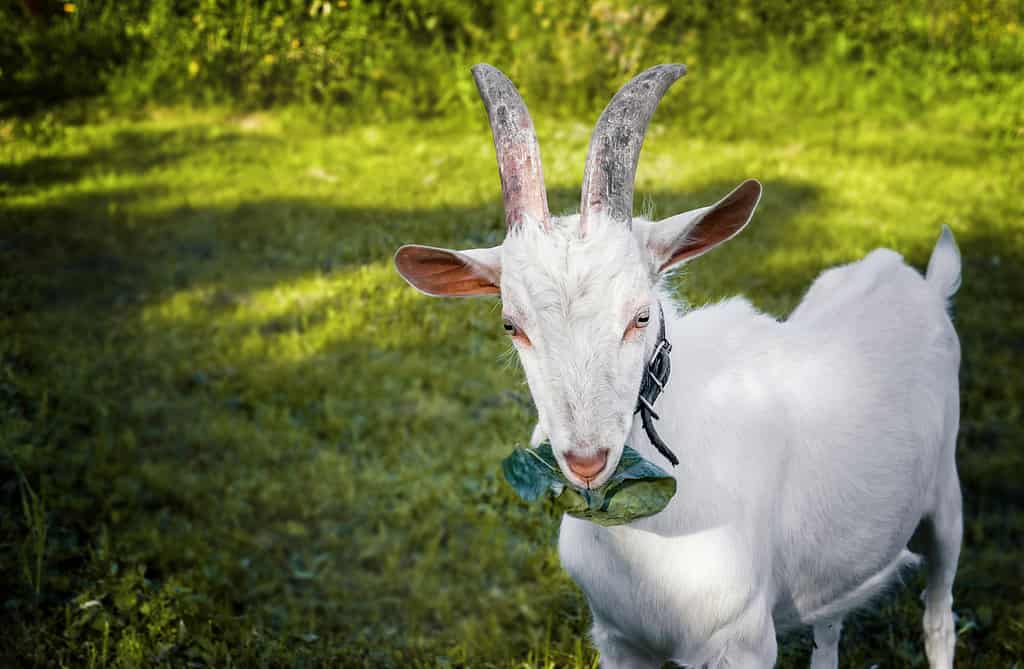
A clean goat is a healthy goat.
©Oxana Medvedeva/ via Getty Images
Goats have hooves that grow constantly. In the wild, they climb and forage over vast distances, which wears out the hooves. For backyard goats, however, you need to do the work. If you do not, your goats will suffer. They might start to limp and will eventually become crippled. Use a good pair of hoof trimmers and cut away the dead, dark part of the hoof. If they bleed just apply pressure to the area and calm the animal. Trim their hooves every six to eight weeks.
Their beards and coats need brushing as well. You can also clip their hair during the spring to keep them cool in the summer. In the fall and winter, they will grow a thick layer of hair that needs regular brushing. The act will also keep parasites away and help you bond with them.
The photo featured at the top of this post is © CreativeFire/iStock via Getty Images
Thank you for reading! Have some feedback for us? Contact the AZ Animals editorial team.






